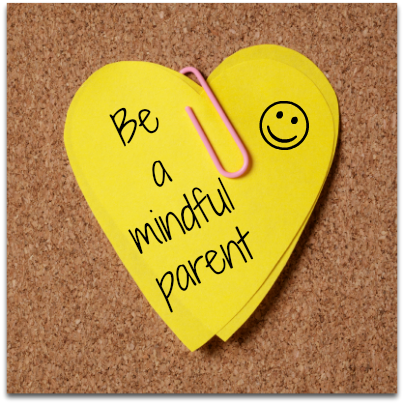 Have you ever tried practicing mindfulness?
Have you ever tried practicing mindfulness?
It can be wonderful — experiences flow over you, making you see new beauty in familiar things. And taking that moment to just see what’s going on can change your whole outlook.
Even in your less-than-proud moments, stepping back and paying attention makes a world of difference — not just for your plans to do better in the future, but for your mood in the moment.
When you really notice that you feel like shouting at your baby for once again head-butting you instead of just going to sleep already, come on, we’re all exhausted — no, sorry, that’s me!
When I’m really noticing, though, I can be a little calmer, a little less frustrated, just because I’ve acknowledged my own frustration.
Well, that’s the problem, though, isn’t it?
That pesky “when I’m really noticing.”
It’s so, so hard to stop in the middle of an emotional reaction and see what’s going on.
Routines and habits can help with this. This blog is full of strategies and success stories for establishing routines and habits
But, I have a confession to make. Every week, I read the article on AFP. Most weeks, I like the strategies suggested and think about implementing them. Many weeks, I really do spend the two minutes on the 2-Minute Action Plan, and put longer-term plans on my to-do list.
Then my coffee break is over, and I go back to work, and by the time I get home I’m thinking about something else, and it’s only at bedtime that I remember the new strategy I was going to try.
It’s so frustrating!
How then can a busy parent get this mindfulness thing started?
I’d like to share with you 3 mindfulness techniques (hacks, actually) that worked for me. Nobody really talks about these techniques (maybe because they are hacks?), but they are so effective. And simple. And just perfect for parents like you and me who want to change/improve but… well, you know the rest of that story already.
First, in the true AFP style, some background on why this works.
Have you heard of the Pimsleur Language Learning System? It is a popular system to teach a new language and one of the core methodology used in this system is the “graduated interval recall”: when you’re first learning a word or phrase, it’s repeated often, and over time it’s brought back less and less frequently (but never dropped completely).
The idea is that you’re reminded of each phrase just before you would have forgotten it.
I’ve found this enormously helpful in my own quest to remember to be mindful.
Someday I’ll create a smartphone app that notices me getting frustrated or distracted and delivers a reminder (a low voltage electric jolt, perhaps?) right on cue.
In the meantime, here are 3 mindfulness techniques that helped me get started with mindful parenting –
#1. Amanda’s Little Yellow Hearts
 Amanda at Dirt and Boogers writes about a trick that’s helped her family remember their intentions: little yellow hearts. Yellow is her son’s favorite color, so she cut little hearts out of yellow construction paper and stuck them up around the house in places where she found she needed a reminder to be kind to her kids.
Amanda at Dirt and Boogers writes about a trick that’s helped her family remember their intentions: little yellow hearts. Yellow is her son’s favorite color, so she cut little hearts out of yellow construction paper and stuck them up around the house in places where she found she needed a reminder to be kind to her kids.
Maybe yellow hearts aren’t your thing, but the idea is easy to adapt: Fill your home with symbols of your goal, especially in places where you’re likely to slip.
Lately, I’ve been losing track of my intention to pay attention to my son’s cues and share his joy in just being a baby. I’m considering an unbroken chain of little hearts running two or three times around the nursery!
In the past, I’ve also taken one of his little toys to work in my purse. It’s a reminder to be fully present at the office now, so I can be fully present at home with my family later on.
#2. Mauricio’s Password Trick
Mauricio Estrella writes about another tactic that’s helped him change his mindset: meaningful passwords. He makes his passwords into mini-mantras, so that he’s reminded of an intention throughout the day as he goes about his regular business. And it really works — typing the password “Forgive#h3r” over and over really did help Estrella move on after a divorce. The next month, when his company’s password policy forced him to change his password, he chose “Quit@smoking4ever” and actually quit smoking. Each month, he picked a new mini-mantra, and each month he managed to reach a new goals.
Next time you have to change a password, try working in a word or phrase that reminds you of your mindfulness intentions. It doesn’t have to be a direct reference (and, for security, it really shouldn’t be a family member’s name or similarly public information). You could include “B@n@n@ Split” if the thought of ice cream reminds you of your ice-cream-loving daughter, or “G3ntle and Qui3t” if you’re working on yelling less.
It’s a good idea (and often, a requirement) to mangle your mantra a little, changing some letters to numbers or punctuation. It’s also a good idea to make it long, and you can make a meaningful password really long if you like.
I’m not about to tell my personal passwords to the whole Internet, but I’m currently using this strategy for two things: a concrete behavioral goal of my own, and my intention to be a more mindful parent.
#3. The Ol’ String Around the Finger Technique
 In the cartoons, when Elmer Fudd wants to remember something, he ties a string around his finger. It’s dorky and clumsy, and that’s why it works! With a big bow in your way, it’s hard to forget there was something you wanted to remember, and most of the time that’s enough.
In the cartoons, when Elmer Fudd wants to remember something, he ties a string around his finger. It’s dorky and clumsy, and that’s why it works! With a big bow in your way, it’s hard to forget there was something you wanted to remember, and most of the time that’s enough.
I don’t always have a piece of string handy. When I want to remember something, and I can’t write it down (say, because I’m driving), or I don’t trust myself to check the to-do list in time (sound familiar?), I mess something up. I move my wedding ring to the other hand (hat tip to Elizabeth Foss for this idea), or my watch to the other arm. At home, you could leave the microwave door dangling open, or fold the hand towel funny in the bathroom.
For this tactic, you want to pick something that will repeatedly, mildly annoy you, but not cause a safety hazard or really set you off in a rage! It’s not sweet like paper hearts. It’s not meaningful in the same way a password mantra is meaningful. But if you pick something annoying, you are guaranteed to notice it.
Again, you’ll want to place your wonderful new annoyance somewhere you’ll see it when you need it most. For example, I thought of the microwave idea because I’m often walking my son to sleep in our kitchen.
“Go to sleep, baby, go to sleep. Come on. Agghhhh! Won’t you please just go to sleep… Why is the microwave door open AGAIN? … Oh, right, mindfulness.”
And I slowly go back to rocking and humming and enjoying the moment the best I can.
Back to Strategy: Graduating Those Intervals
This is the best part, or at least the easiest! As your habits change and you get better at remembering your intention of being mindful, you’ll need fewer reminders. Then, as you get a little complacent, you’ll maybe need more… wait, are we talking about me again?
Anyway, reminding yourself less often tends to happen naturally. A few of the yellow hearts will fall off the wall on their own. A meaningful password will expire, and you’ll be tired of it anyway, and switch it to a new habit or just to the usual random junk. It’s easy not to leave the microwave hanging open. This creeping entropy happens on its own. At the beginning of this article, it was our enemy, the way we forgot our intentions, but as those intentions become more firmly rooted, it’s really not a problem.
And if you notice, after a while though, that you’re once again forgetting to be mindful, it’s easy to tighten up your game with a new round of low-tech automatic reminders.
2-Minute Action Plan for Fine Parents
For our quick action today, choose one situation where you’d like to be more mindful. Which of the mindfulness techniques would work for you in this situation? A password mantra? A paper heart or a printout of our member-only quote posters (see red box above)? Something else? (Be sure to share with me in the comments below – I’m always on the lookout for new tips) Can you set up such a reminder right now?
- If you can, do it!
- If you can’t, try moving your watch to the other arm — so that when the time comes you’ll remember your plan.
Ongoing Action Plan for Fine Parents
In the next few days, leave yourself more of these little re-mindful-ers. At the end of the week, check in with yourself. Did they help? Is your mindfulness habit getting more established?
Hi Suminitha and Lily,
I stumbled your blog 3 months ago and I really like it and I’m grateful. The principles and lessons has helped me become a better dad. My relationship with my kids have improved a lot. I really like the summary and action plan at end of each article.
I would be interested to contribute some articles for your blog. I’m not a blogger but I would like to somehow give back to your blog.
Thanks,
Alvin
I’m so happy that the blog has been working for you, Alvin! Thank you for letting me know (I never tire of reading these comments ;))
I’d love to share your experiences and lessons that you’ve learned in your parenting journey with the rest of the AFP community. I accept articles during a 5-day submission window each month. The current month’s window has passed, but you can sign up here to be notified of next month’s topic and submission window. I look forward to your article!
Take care and good luck in this journey!
I’m so glad this article prompted you to comment, Alvin! I submitted it for just the same reasons you describe — I appreciated the weekly “workouts” and wanted to give something back!
I just found your website. I am really enjoying it. I really appreciate your hacks. I am a new mom to a sweet 5 months old girl and I need the reminds to be loving and present with my husband. I have endless affection for her but then I forget about hubby. New password lov3daddy 🙂
Welcome on board, Teresa! So glad you found us 🙂
Yeah, the first couple of years of having kids can really take a toll on the relationship between the parents. So glad that you’ve decided to use the password hack to address that!
Ack, don’t tell us all your password! 🙂 So glad to hear my tricks are resonating with others. I hope it helps!
The password idea is interesting and one I’ve never heard of!
I have my own variation of the string on the finger. I once bought matching bracelets for me and my daughters, and we wear them on special days when it helps to think of each other. For instance, one of my girls was nervous about doing something on her own at school, and I told her we would both wear our bracelets that day so she’d know I was thinking of her and she could be reminded that I was on her side even if I wasn’t literally next to her. Sometimes I wear mine on days when I know I won’t be able to see them for a long stretch. Anyway, there can be more stylish alternatives to a string!
That password idea is really neat, isn’t it? I hadn’t heard of it either, but it makes so much sense… if you’re going to type the password many times through the day, might as well make it something worthwhile! For me, it works mainly for the computer password, but not website passwords, since I have the “remember password” box checked on most commonly visited sites. When I used to go to work, and the policy was that we could not save passwords and had to change it every few months, this would have worked much better!
And I LOVE your idea of matching bracelets… I will try it with my daughter. She is really into rainbow loom these days, so on the weekend we’ll make some “special” matching bracelets that we can use for a similar purpose!
That bracelet idea is so cool! Thanks for sharing it!